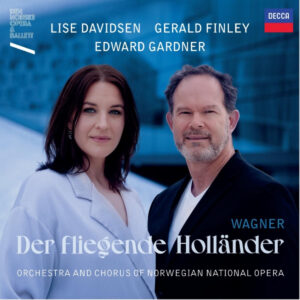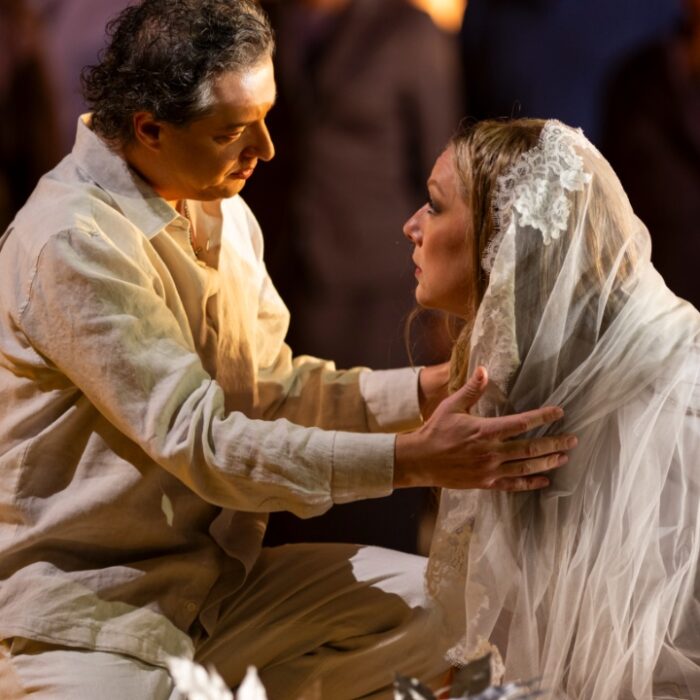
CD Review: Decca’s ‘Der fliegende Holländer’
By Bob DieschburgDrawn from two live performances in 2024, the Decca release of “The Flying Dutchman” arrives with no small sense of occasion. Its cast alone—Lise Davidsen, Gerald Finley, Stanislas de Barbeyrac—promises one of the most congenial pairings in recent memory.
“The Flying Dutchman” has always occupied a somewhat ambivalent place in the Wagnerian discography: too early to be “Tristan,” too compact to compare with the “Ring,” yet often more revealing of a conductor’s dramatic instincts than the later works. Edward Gardner, for Decca, embraces the opera’s taut construction and storm-lit sweep unapologetically—and with a fresh sense of immediacy.
Swells of Drama
Gardner’s “Dutchman” is swiftly paced and fiercely accented, with the iconic brass motif syncopated for dramatic effect. From the very first bars, it pulsates with anxiety. Unlike Klemperer and his consorts, Gardner barely hints at the score’s symphonic undertones.
His overture, for instance, clocks in faster than that of almost any of his competitors. It is wrapped, forcefully, in a vision of narrative continuity that refuses to relent. Even in passages where operatic convention tends to prevail (think of some of Daland’s music), there remains an overarching sense of homogeneity. This may be Gardner’s most significant achievement—helped, as he is, by the extraordinarily precise musicianship of the Norwegian National Opera.
A Senta for the Ages
If it were not unimpeachable in its own right, one might say that Gardner’s direction merely sets the stage for Lise Davidsen—whose Senta, by any standard, reigns supreme. Her crystalline voice blends with the brightness of the orchestra and dominates the ensembles. Notably, it proves instrumental in catapulting the drama to its emotional heights. Her self-sacrifice, for example, is both chilling and grandiose. Most impressive, however, is Davidsen’s uncanny ability to modulate her expressivity.
In this, the chiaroscurist intonation of “Johohoe” in her Act two ballad stands unique as a display of interpretive mastery that flows seamlessly into the pulse of its refrain-like sections and back again. Her Senta—despite herself—avoids the pitfalls of vocal monolithism; if anything, Davidsen’s portrayal is one of the very finest on record. It makes one regret that the soprano has indicated she does not plan to return to the role.
Gerald Finley, for his part, proffers a Dutchman of somewhat austere yet finely wrought gravity. His baritone is not cavernously resonant, nor imbued with the blackness of someone from the netherworld. Instead, one senses the Lied singer behind every phrase—Finley’s German is impeccable, each syllable weighed with care.
In “Die Frist ist um,” for instance, there perspires that peculiarly German strain of Angst, translated, perhaps, as a kind of weary dignity that does not so much dominate as haunt. Therein lies Finley’s strength: by insinuation, he crafts a powerful character profile that, next to Davidsen’s sweep, very aptly holds its ground.
The supporting cast is altogether inspired. Stanislas de Barbeyrac leans toward a spinto-heavy interpretation of Erik, though it proves by no means devoid of lyricism. His cavatina is particularly emphatic. Meanwhile, Brindley Sherratt offers a grounded Daland, very much in line with the recording tradition. Both inhabit their respective parts with assurance. Eirik Grøtvedt’s Steuermann is likewise more than serviceable, bringing an unusual softness to his Act one song, “Mit Gewitter und Sturm aus fernem Meer.”
A 21st Century Reference?
Decca’s “Flying Dutchman” is not only about the urgency imparted to the score by Gardner, now director of the Norwegian National Opera and Ballet. It revolves, first and foremost, around the incandescence of its Senta—the recording’s vocal axis—whose spellbinding physicality is without comparison. Lise Davidsen is of Olympian stature.
Gerald Finley, by comparison, may feel understated—perhaps too much so for habitués expecting the brute force of a revenant. Still, his restraint, even sophistication, brings with it an interpretive integrity that fully justifies itself. Herein lies, to my taste, an example of the recording’s stirring modernity.


